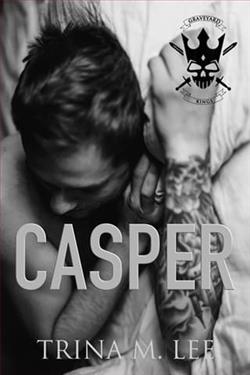Page 29 of A Kiss Gone Wylde
“Do not do it, Wainwright. Lower your weapon!” Payne ordered him.
Wainwright simply tightened his grip. “Or you’ll kill me? I am a dead man already, Davenport. Hasn’t your little harlot of a wife told you? I have the bloody pox! It’s already eating away at my face… a pistol ball would be preferable to a slow and miserable death!”
“You cannot shoot an unarmed andunconsciousman!” Payne snapped. “Even in your self-pitying misery, surely you can see that.”
Every attempt to reason with the man was met with obstinance. Wainwright would murder Viscount Gordon in cold blood. Because the pox was not simply rotting his face. His brain was no doubt riddled with the disease, as well. No sooner had that realization struck than Payne pulled back the hammer on the pistol he had.
To Wainwright he offered, “Do not let your last act on this earth be one of such selfishness. If you kill him, I will kill you. Two dead needlessly. But if you truly feel death is preferable, then you have the means in your hand to end your own existence.”
“To spare your conscience? I think not, Davenport. I rather like the idea that my death will weigh on your soul for all time.” With that Wainwright turned the gun away from Gordon and aimed directly at Benny instead. “What’s that old line? If I can’t have her then no one will?”
The shot rang out and Benny waited for the explosion of pain, for the blood that would surely be flowing freely from her body to fully saturate her gown. And yet it never came. Glancing up, she saw the pistol in Payne’s hand was smoking. Then she heard the terrible thump as Wainwright’s body hit the floor.
“Is he… ?” Benny couldn’t actually form the question fully. But then she didn’t need to. Payne turned to face her and his expression, grim and bleak, told the story. He’d killed Wainwright because the man had left him with no other choice. “You had to. He would have killed the viscount or he would have killed me. He made you do it.”
“We’ll have to go before the magistrate. My hope is that it will all go away quietly without the need for an inquest. There are enough witnesses if they can be bothered to speak up,” he said.
“Payne?”
“Do not,” he said. “I know what my options were and I know I made the right decision. But I cannot speak of it now and then turn about and go through it all with the magistrate again. Let’s just leave it for the moment.”
No matter what was happening between them, she could see that he was suffering. And it broke her heart for him. That was the moment that she realized she loved him. Three days, three hundred days, three thousand days. Did it matter? But loving him did not guarantee being loved by him and that meant she had to be cautious. She had to protect herself.
Benny nodded. “All right.”
* * *
After two hours, the magistrate, who conveniently was also the coroner, had come and gone. After speaking with the witnesses, he’d elected not to pursue any formal charges. There would still be a scandal, at least some small degree of it, but far better than it would have been had he been tried for murder.
Gordon had awakened prior to the man’s arrival and provided his account of Wainwright’s abduction of Benny. The man still had not explained exactly what his relationship with Anne had been or why he felt the need to avenge her. But in truth, Payne wasn’t sure it mattered. Anne was gone. Her short life had ended tragically but he could not and would not dwell on it any further than he already had. Enough of his life had been eaten away by that thanks to his mother’s manipulations and his own obstinate nature.
After some finagling, he’d hired a carriage to get them home, Gordon included given his recent head injury, and their horses would be fetched by a stable lad in the morning. As he bundled Benny into that carriage, neither of them spoke. They remained silent for the journey.
As if sensing that the mood was not conducive to idle chatter, Viscount Gordon remained silent also. It was just as well, there was really only one thing that the man could have to talk about that would be of any interest to Payne and that was not a conversation he was certain he wanted to have in front of Benny. Not because he felt her sensibilities too delicate or because he wished to keep any secrets from her.
His mother had hurt her with her exaggerations of his continued mourning of Anne. And his secrecy, unintentional as it had been, had contributed to that hurt. To dive into Anne’s apparently tumultuous history in front of her would only be to invite further speculation regarding his feelings for a woman that, in truth, he was finding it harder by the day to even remember. Clearly, he had not known her as well as he had once thought.
Payne could clearly recall that he’d been quite enamored of her. But recalling the details of who she was, recalling the events that had transpired between them during their courtship—it had all grown hazy, muddled by the fog of anger and the objective of justice or vengeance. Those thoughts weighed heavily on him, making him question whether or not his feelings for Anne had ever been as deep as he’d once thought them, or if what he’d perceived to be love was nothing more than youthful enthusiasm.
After Gordon was dropped off at his rooms on Jermyn Street, the coach turned, leading them through Mayfair and toward Upper Brook Street. When the carriage halted, the driver lowered the steps and Payne climbed down, reaching back to offer Benny his hand.
But she was looking into the distance, her lips parted on a silent cry and an expression crossed her face that could only have been described as agony. Had she been injured and he simply hadn’t noticed it? Or worse still, had she been injured and not said anything because she deemed it somehow not important. It would certainly be like her. “Are you in pain?”
“No. But I soon will be.Thatis my father’s carriage,” she said, pointing toward a carriage that loitered at the end of the street. “He and my mother have descended upon us… They are here to demand an accounting, no doubt. Well, my father is. My mother is here to weep piteously as she bemoans the fact that I denied her the joy—nay the right—of planning her eldest child’s wedding.”
It was like a comedy of errors, except none of it was funny. The day had been filled with one dreadful event after another and there seemed to be no end to it. Still, he tried to force a smile for her benefit. “You bravely faced down my mother. How can I do less?”
18
They climbed the steps and Benny was consumed with dread. Payne stood behind her, his hand at the small of her back. As soon as she could, she stepped away from him, putting distance between them. It wasn’t anger. It was caution. Until she knew the truth about his past and about Anne Bardwell,and about his feelings for her,she needed to guard herself.
Looking up, she caught his puzzled and questioning gaze. But before he could even give voice to whatever he was thinking, the door opened and Barrett simply appeared there, rather like magic. The sound of raised voices could be heard from within.
“Oh, dear,” Benny said and then rushed up the steps and past the startled butler. She could hear her father shouting in the drawing room. Her mother was weeping copiously, sobbing that her daughter had vanished.
“I have not vanished, Mother,” Benny called out, as she paused before the mirror hanging in the entryway to tidy her hair and dress a bit before facing them. She should have known better. Always impatient, her father burst from the drawing room and out into the corridor. His face was florid with anger, a vein in his forehead visibly pulsing.
“Benedicta, what is the meaning of this? You have married this… this… this scoundrel?” her father demanded.















